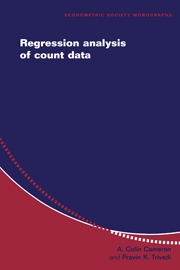Book contents
- Frontmatter
- Contents
- List of Figures
- List of Tables
- Preface
- 1 Introduction
- 2 Model Specification and Estimation
- 3 Basic Count Regression
- 4 Generalized Count Regression
- 5 Model Evaluation and Testing
- 6 Empirical Illustrations
- 7 Time Series Data
- 8 Multivariate Data
- 9 Longitudinal Data
- 10 Measurement Errors
- 11 Nonrandom Samples and Simultaneity
- 12 Flexible Methods for Counts
- Appendices
- References
- Author Index
- Subject Index
- Titles in the series
3 - Basic Count Regression
Published online by Cambridge University Press: 05 January 2013
- Frontmatter
- Contents
- List of Figures
- List of Tables
- Preface
- 1 Introduction
- 2 Model Specification and Estimation
- 3 Basic Count Regression
- 4 Generalized Count Regression
- 5 Model Evaluation and Testing
- 6 Empirical Illustrations
- 7 Time Series Data
- 8 Multivariate Data
- 9 Longitudinal Data
- 10 Measurement Errors
- 11 Nonrandom Samples and Simultaneity
- 12 Flexible Methods for Counts
- Appendices
- References
- Author Index
- Subject Index
- Titles in the series
Summary
Introduction
This chapter is intended to provide a self-contained treatment of basic cross-section count data regression analysis. It is analogous to a chapter in a standard statistics text that covers both homoskedastic and heteroskedastic linear regression models.
The most commonly used count models are Poisson and negative binomial. For readers interested only in these models it is sufficient to read sections 3.1 through 3.5, along with preparatory material in sections 1.2 and 2.2 in previous chapters.
Additional regression models for cross-section count data are given in the remainder of Chapter 3, most notably the ordered probit and logit models. These additional models generally ignore the count nature of the data. Still further models, such as the hurdle model, which do explicitly treat the data as count data, are given in Chapter 4. Some model diagnostic methods are presented in Chapter 3, but most are deferred to Chapter 5.
As indicated in Chapter 2, the properties of an estimator vary with the assumptions made on the dgp. By correct specification of the conditional mean or variance or density, we mean that the functional form and explanatory variables in the specified conditional mean or variance or density are those of the dgp.
Information
- Type
- Chapter
- Information
- Regression Analysis of Count Data , pp. 59 - 95Publisher: Cambridge University PressPrint publication year: 1998
Accessibility standard: Unknown
Why this information is here
This section outlines the accessibility features of this content - including support for screen readers, full keyboard navigation and high-contrast display options. This may not be relevant for you.Accessibility Information
- 1
- Cited by
